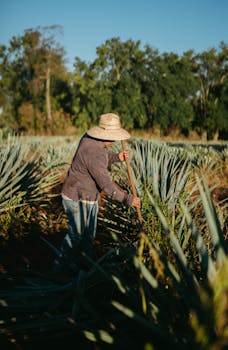
**
The ongoing debate surrounding immigration in the United States has taken a new turn with the potential implementation of a "temporary pass" program for undocumented workers in the farming and hospitality sectors. While details remain scarce, the proposed plan, originating during the Trump administration, aims to address the labor shortages plaguing these crucial industries while simultaneously attempting to enforce stricter immigration control. This article delves into the intricacies of this proposed solution, examining its potential impact on undocumented immigrants, employers, and the broader US economy.
Understanding the Proposed "Temporary Pass"
The core concept of the proposed "temporary pass" revolves around providing legal authorization for undocumented individuals already working in agriculture and hospitality to remain in the country for a specified period. This authorization, unlike traditional immigration visas, would likely be tied to continued employment in these designated sectors. The specific details regarding application processes, eligibility criteria, and the duration of the pass are yet to be fully clarified. However, the underlying goal is to create a pathway for these workers to remain legally employed, allowing them to pay taxes and contributing to the economy without fear of deportation.
Key Objectives of the Proposed Program:
Addressing Labor Shortages: Both the agricultural and hospitality industries consistently face significant labor shortages. Many employers rely on undocumented workers who possess the necessary skills and experience. The "temporary pass" aims to alleviate these shortages by allowing these individuals to continue working legally.
Enhancing Tax Compliance: Undocumented workers often operate within the "shadow economy," failing to pay income taxes. This program aims to bring them into the formal tax system, increasing government revenue and ensuring fair competition for businesses that comply with tax laws.
Improving Workplace Safety: By providing a legal framework, the program could potentially improve workplace safety for undocumented workers, as they would be less vulnerable to exploitation and abuse due to their undocumented status.
Maintaining Experienced Workforce: Businesses in agriculture and hospitality often invest heavily in training their workforce. A temporary pass allows businesses to retain experienced and skilled employees.
Potential Benefits and Drawbacks
The proposed "temporary pass" presents a complex mix of potential benefits and drawbacks. While it could address crucial labor shortages and boost tax revenue, it also raises concerns about fairness, potential abuse, and its long-term implications for immigration policy.
Potential Benefits:
- Economic Growth: The contribution of undocumented workers to the US economy is significant, especially in agriculture and hospitality. Legalizing their status would allow them to contribute more formally, boosting economic productivity.
- Increased Tax Revenue: As mentioned, bringing undocumented workers into the formal tax system will significantly increase government revenue.
- Improved Working Conditions: Workers under a legal framework are less likely to be subject to exploitation and abuse.
- Addressing Industry Needs: It directly addresses the critical labor shortages within agriculture and hospitality, ensuring the continued operation and success of these vital sectors.
Potential Drawbacks:
- Potential for Abuse: The system could be vulnerable to abuse if not properly implemented and monitored, potentially leading to fraud and illegal activity.
- Limited Scope: The focus on agriculture and hospitality may exclude other sectors also facing labor shortages.
- Pathway to Permanent Residency?: The lack of clarity regarding a potential pathway to permanent residency raises concerns for the workers involved, leading to uncertainty about their future.
- Political Opposition: The plan is likely to face significant political opposition from both sides of the aisle, potentially hindering its implementation.
Comparing with Other Immigration Reform Proposals
This "temporary pass" proposal differs significantly from other comprehensive immigration reform plans that often address a broader range of immigration issues, including pathways to citizenship and addressing the backlog of immigration applications. This targeted approach focuses specifically on addressing the labor shortages in agriculture and hospitality. It's a more incremental approach compared to the more sweeping reforms often debated in Congress.
The Future of Undocumented Workers in Agriculture and Hospitality
The future of undocumented workers in these sectors hangs in the balance. The success of any "temporary pass" program hinges on its careful design, effective implementation, and rigorous enforcement. Without addressing the underlying issues of immigration policy, this approach may only offer a temporary fix. Further discussions are needed to fully understand the complexities of this proposal and weigh the potential consequences. The debate will certainly continue as stakeholders seek to balance the needs of these essential industries with broader immigration concerns. Monitoring the progress of this proposal is vital for anyone interested in immigration policy, the agricultural sector, and the hospitality industry. The future ramifications could be substantial, impacting millions of workers and the overall US economy. Ongoing developments will continue to shape this vital discussion and determine the future of this controversial, yet potentially impactful, immigration policy proposal.




















